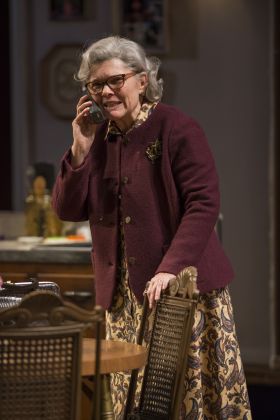
The first characters we meet introduce themselves to us as, respectively, Television, played by a bubbly Sally Murphy, and Cancer—the disease, not the astrological sign—portrayed by a suave Tim Hopper (not to be confused with the Angel of Death, who appears later in the play as the most ludicrous personification of the Grim Reaper since Edward Albee's beach boy in The American Dream). When the conversation of the remaining onstage personnel in Visiting Edna revolves around such icky geriatric-linked bodily functions/apparatus as heart failure, diabetes, arthritis, food allergies, diarrhea, colostomy bags, and lasik pills, however, it should come as no surprise that we attend more closely to the allegoricals—in particular, Cancer, whom we assume knows more about fatal pathogens than those afflicted therewith. Having begun his narrative in expressionistic mode (think Thornton Wilder, Elmer Rice and medieval morality fables), David Rabe—a playwright whose Vietnam War chronicles during the 1970s ensured his place in the North American theater repertoire—proceeds to bear witness to the responses of two clueless humans confronting the news that elderly Edna is dying, and nothing that her guilty son Andrew, or medical technology in 1990, can change that fact. "They don't even mention me, but I'm the reason he's here" Cancer observes soon after Andrew arrives. In fact, parent and child do not discuss the purpose of this visit until nearly 30 minutes into the two-and-a-half hours it takes them to finish articulating their sentiments on the matter. In the meantime, they circumvent the topic by mocking the fury of thunderstorms in cartoonish tweety-bird voices, bickering over Edna's plan to jettison her collection of family photographs, and reminiscing on the long-deceased husband/father and the contradictions surrounding his crippling injuries in an automobile accident. Their evasive tactics are interrupted from time to time by incoming phone calls, an appointment with yet another doctor, the efforts of Television to brighten the lugubrious atmosphere, and of Cancer to exacerbate the gloom upon which he thrives. Plays depicting deathbed dynamics being typically rooted in the playwright's own experience, it seems churlish to suggest that Rabe's disclosures may be unnecessarily protracted (a common flaw of world-premiere productions), or that his anthropomorphism risks injecting opportunities for inappropriate humor. The ensemble of mostly-seasoned actors led by Debra Monk and Ian Barford soldier through their repetitious text, accompanied by Rob Milburn and Michael Bodeen's minimalist musical and meteorological soundscape, but by the time Andrew offers us no less than two accounts of Edna's final moments, our only hope for this unhappy clan lies in its matriarch's swift and peaceful departure.
